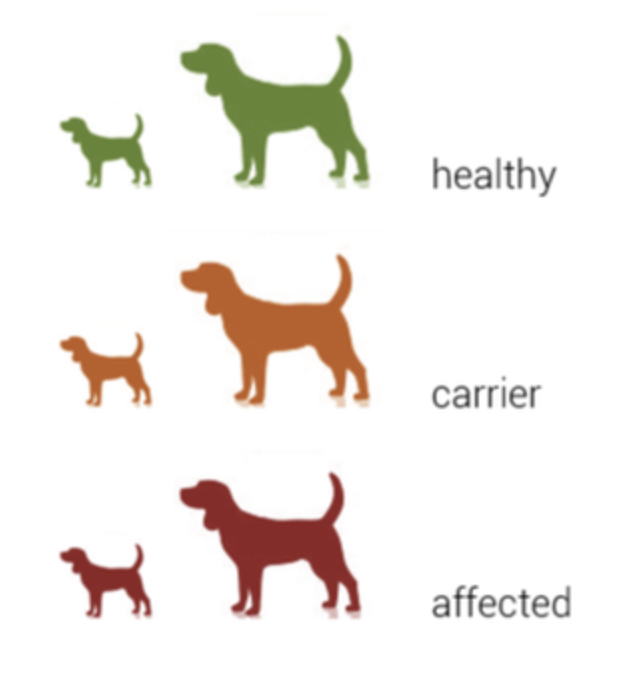What’s so important about dog DNA?
This blog post will cover why it's so important to purchase a puppy from a breeder who does DNA tests on their breeding stock and what to look for when provided a copy. We will cover in a future post why you might consider DNA testing your own dog, especially if you rescued, purchased from a puppy store, or bought a puppy without researching the breeder.
The Cavalier King Charles Spaniel is prone to numerous health conditions, many of them both financially and personally devastating for their owners. Years ago, we didn't have DNA testing available to help us identify dogs that were at risk for passing on serious genetic defects. Today, that's not the case and therefore any reputable breeder will be able to discuss with you the role that DNA plays in their breeding program and provide you with testing results. Before discussing specific genetic conditions that impact this breed we want to cover the basics of understanding whether a dog is genetically clear (healthy), a carrier (healthy but can pass on the disease to puppies) or affected (unhealthy and will pass on the disease).
CLEAR - This is the gold standard. This is a dog who is clear of any genetic defects. This means they are not personally at risk and do not carry any genes for genetic defects that can be passed on to their puppies.
CARRIER - A carrier is a dog who carries one (1) gene for a genetic defect. Because they only carry one gene for this defect it will not affect them (they will never develop the defect) but they can pass it on to their puppies. Some consumers mistakenly believe that carriers should not be bred but this is not the case. Carriers can safely be bred but only to a dog who is clear for that defect. If we removed all carriers from our breeding pool we would encounter other problems with inbreeding. Two carriers should not be bred.
AFFECTED - A dog who is at risk (or affected) is a dog who carries 2 copies of the gene for a trait and therefore is at risk for the disease. Although not ideal, this dog can still be bred to a dog who is clear as they will produce a litter of carriers. That being said, you do not want to purchase a dog who is affected by a genetic condition as that dog will likely become symptomatic of that condition. If your breeder doesn't test genetically then you will have no way of knowing what you are getting.
This diagram helps illustrate the breeding of clear, carriers and affected dogs.
Now that you have an understanding of clear, carrier and affected you need to know what genetic tests are important for this breed. At a minimum, a reputable breeder should be testing for the following:
Dry Eye Curly Coat Syndrome
Muscular Dystrophy
Episodic Falling Syndrome
Degenerative Myelopathy (DM)
To see a sample Embark DNA report, please check out this post where we provide a report from one of our dogs.
A few final words for those looking for a hybrid puppy (Cavachon or Cavapoo). First, be very wary of the hybrid breeder who claims they don't need to DNA test their dogs because crossing two breeds will eliminate the genetic disorders. This is false. This breeder is either being deceptive or has just shown their ignorance. For example Degenerative Myelopathy (DM) which is a devastating neurological disorder that doesn't appear until a dog is older (and his/her puppies have already been sold). This disease is similar to ALS or Lou Gehrig's in humans. This disease also appears in both poodles and Cavaliers; therefore, a hybrid breeder who is not testing both parents for the common disease(s) is setting up puppy owners for heartbreak.
Secondly, this is where the difference between a F1 puppy and an F2 puppy is really important. With F1 puppies many of the diseases can be eliminated if they are not a common disease; however, with F2 puppies you bring the disease possibility back. This often confuses people so here is an example:
F1 Cavapoos - A purebred Cavalier Spaniel is crossed with a purebred Poodle. The Cavalier Spaniel is affected for DM. The Bichon is clear for DM. As you can see from the chart above, 100% of their offspring will be a carrier for DM. They will not have the disease but they will pass it on to their hybrid offspring.
F2 - An uneducated breeder has two F1 Cavapoos. Both were from a situation similar to the above and carry for DM but don't show signs of the disease. The breeder doesn't DNA test because they are breeding hybrids and were told it isn't necessary or is trying to increase profits by not testing. They breed these dogs together and again referring to the chart above more than 50% of their puppies will inherit and be affected by this disease. The new owner is clueless and feels confident in this breeder because they received a one-year health guarantee for a condition that will not appear for 7+ more years.
DNA testing alone does not make a reputable breeder. There are other breed specific heart, hip, eye and related tests that should be performed and provided. For more information on those tests, please see our posts on the OFA as a part of your puppy search.
If you would like to learn more about DNA testing your dog before breeding or to uncover any potential health risks, we highly recommend Embark as they handle all of our DNA testing and are a paid advertiser of our educational content. Please review this post that provides Embark discounts and a copy of an Embark report.



